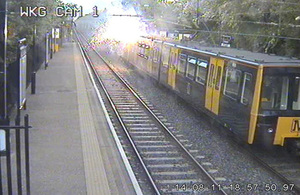Report 09/2015: Parting of live overhead wire at Walkergate
RAIB has released its report into an incident in which the live overhead wire parted at Walkergate station, Tyne and Wear Metro, 11 August 2014.

Image courtesy of Tyne and Wear Metro
Summary
At around 18:56 hrs on Monday 11 August 2014, a Tyne and Wear Metro train at Walkergate station, developed an electrical fault in equipment under the rear car, which tripped the power supply to the overhead wire. About a minute later, the power was remotely restored by a power controller and a fire started in the faulty equipment. The fault drew a high current from the overhead wire through the car’s pantograph, causing localised overheating and, after about 18 seconds, the wire parted. The loose ends of the live wire flailed around the train roof, showering sparks, and one end fell on the platform. A second power controller happened to observe events on station CCTV and power to the overhead line was disconnected. The parted overhead wire had remained live for approximately 14 seconds.
At the time of the accident, the train doors were closed for departure and there were no passengers on the platform. About 30 passengers got out of the train after the power was turned off. There were no reported injuries, although passengers were evidently distressed.
A sustained high current was drawn because the electrical fault occurred in a part of the train’s power circuit which was not protected by on-train equipment and which could only be detected by the overhead power supply protection equipment. However, because of the way that the power was switched back on, the level of current drawn by the fault was not sufficient to immediately activate that protection. The underlying cause of the accident was the ineffective management of risks created at the interface between system components, comprising the power supply, power control and the train.
The RAIB observed that the arrangements between the infrastructure operator, Nexus, and the train operator, DB Regio Tyne and Wear, did not effectively facilitate the sharing of relevant health and safety information on risks created within the system. It also observed deficiencies in the competence management of the power control function and in the regime for assuring the continued integrity of some electrical protection equipment.
Recommendations
As a consequence of this investigation, RAIB has made three recommendations. The first, addressed to Nexus, seeks improvements in its safety management system to provide a more effective framework for the management of its shared risks. The second, addressed to both Nexus and DB Regio Tyne and Wear, relates to the identification and evaluation of risks created at the interfaces between their organisations. The third recommendation, addressed to both organisations, seeks to achieve more comprehensive power control procedures to facilitate safe decision-making.
Notes to editors
-
The sole purpose of RAIB investigations is to prevent future accidents and incidents and improve railway safety. RAIB does not establish blame, liability or carry out prosecutions.
-
RAIB operates, as far as possible, in an open and transparent manner. While our investigations are completely independent of the railway industry, we do maintain close liaison with railway companies and if we discover matters that may affect the safety of the railway, we make sure that information about them is circulated to the right people as soon as possible, and certainly long before publication of our final report.
-
For media enquiries, please call 020 7944 3108.